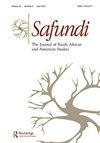“Cultures of populism: institutions and hegemonic practices” – a brief introduction
IF 0.1
Q4 AREA STUDIES
Safundi-The Journal of South African and American Studies
Pub Date : 2020-07-02
DOI:10.1080/17533171.2020.1775363
引用次数: 0
Abstract
ABSTRACT This short Introduction sets the context for the nine articles included in Safundi’s special issue on “Cultures of Populism: Institutions and Hegemonic Practices” (Vol. 21, no. 3) by establishing connections with the colloquium of the same name that was hosted at the University of the Witwatersrand in Johannesburg from 10th until 13th July 2019. At the conference, populism (whether of the political right or the left) was examined in relation to democracy, the role of elites, and possible futures for the Humanities. Drawing on a range of theoretical perspectives, papers considered the diverse histories of populism, as well as varied occurrences of this phenomenon across the globe.“民粹主义文化:制度与霸权实践”-简介
这篇简短的引言为萨弗迪《民粹主义文化:制度与霸权实践》特刊(第21卷第1期)中的九篇文章设定了背景。3)与2019年7月10日至13日在约翰内斯堡威特沃特斯兰德大学举办的同名研讨会建立联系。在这次会议上,民粹主义(无论是政治上的右翼还是左翼)与民主、精英的作用以及人文学科可能的未来有关。利用一系列理论观点,论文考虑了民粹主义的不同历史,以及这种现象在全球范围内的不同发生。
本文章由计算机程序翻译,如有差异,请以英文原文为准。
求助全文
约1分钟内获得全文
求助全文
来源期刊
CiteScore
1.00
自引率
0.00%
发文量
0

 求助内容:
求助内容: 应助结果提醒方式:
应助结果提醒方式:


